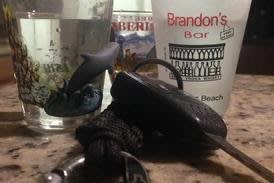New 2016 Senate Bill 1244 Provides Harsher Penalties for a First Refusal
Jan. 7, 2016
 On December 28, 2015, Republican Senator David Simmons filed a new senate bill, Bill 2016 1244, that defines a first refusal of a breath, blood or urine test as an “offense” and provides for certain penalties on top of what the Department of Motor Vehicles can currently impose. This bill could potentially go into effect in December this year. If approved as currently suggested by the bill the penalties would be as follows:
On December 28, 2015, Republican Senator David Simmons filed a new senate bill, Bill 2016 1244, that defines a first refusal of a breath, blood or urine test as an “offense” and provides for certain penalties on top of what the Department of Motor Vehicles can currently impose. This bill could potentially go into effect in December this year. If approved as currently suggested by the bill the penalties would be as follows:
A fine between $500 and $1000;
Probation for 6 months; and
4 points on the person’s driver’s license.
The statute leaves the definition of a second refusal unchanged as a first degree misdemeanor. As such a second refusal is clearly a crime and punishable by up to 1 year in the county jail or 12 months probation and a $1000 fine. The bill does however, add that a judge is no longer allowed to “withhold adjudication” on a second refusal. This means that if found guilty of a second refusal, the person would have a permanent criminal record and conviction for a misdemeanor. This makes a person found guilty of this crime a convicted criminal no matter what the outcome of the DUI charge would be that often times accompanies a refusal charge.
The new bill however poses certain questions when it comes to the first refusal. These questions are:
What type of offense a first refusal is. Is it a crime or a non-criminal violation?
If not a crime, who would be the prosecuting party – can it still be prosecuted by the state attorney’s office?
If the person violates probation, what would be the sanctions for violating probation – could the court impose jail time at that point?
It seems that the new bill would not make a first refusal a crime. That is supported by the wording in the bill which defines it as simply an “offense” but a second refusal as a first degree misdemeanor. Furthermore Florida Statute 775.08 defines a misdemeanor as “any criminal offense that is punishable … by a term of imprisonment in a county correctional facility” or a jail. The same statute defines a felony as “any criminal offense that is punishable … by death or imprisonment in a state penitentiary” or prison. However, the same statute defines “noncriminal” violation as an offense that can only be punished by a fine. So it seems that this new offense does not fit any of the current classes of offenses. Since the state attorney’s office only prosecutes criminal offenses, and this new offense does not seem to fit the definition of a crime under Florida law, it seems that the state attorney’s office would not be able to prosecute this offense.
The next problem arises when a person who is found to have committed the offense of a first refusal violates probation. It would appear based on current Florida law that a judge could not sentence a person to jail time for a violation of probation for this charge alone. That is because Florida Statute 948.06 says that a person can only be punished to the maximum penalty on the original underlying charge. This means that for a violation of probation, the person could only be punished by the maximum possible penalty provided in the newly amended statute for a first refusal. Since the new bill does not allow for a possible jail sentence for a first refusal, it appears that the court would be bound by that on a violation of probation as well.
It is clear that the new bill poses many questions that can only be speculated on at this time. Therefore, it is advisable for a person charged with this offense to hire an attorney to look into all of the possible defenses for the charge. You can always contact the Wade Law Firm at 813-401-0130 for a free case evaluation if charged with DUI and or refusal or another criminal offense.
